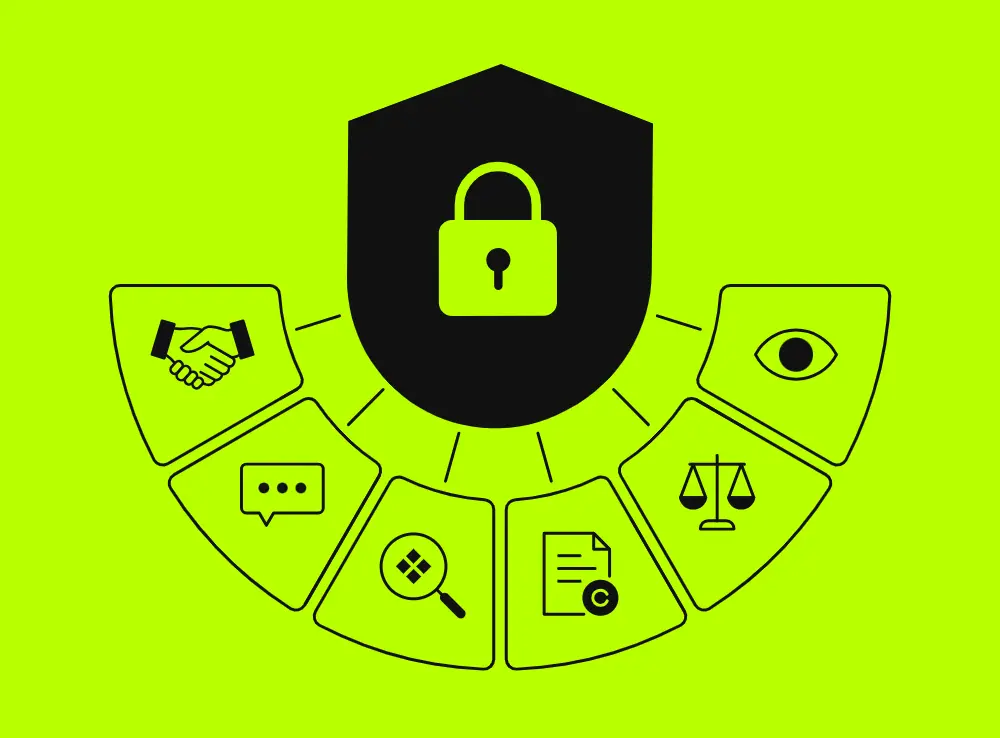How To Protect Your Brand On Social Media
How To Protect Your Brand On Social Media
Your brand faces threats from countless directions across social media platforms. Hackers infiltrate accounts and post malicious content, impersonators create fake profiles to scam your customers, competitors misuse your brand assets for their own gain, and phishing attacks target both your business and your audience.
These threats can destroy years of work in minutes. A single compromised post or successful impersonation attempt can damage customer trust permanently and cost your business significant revenue.
That’s why in this post, we'll cover what social media brand protection is, why businesses need robust protection strategies, and seven proven methods to protect your brand's online presence effectively.
What Is Social Media Brand Protection?
Social media brand protection means keeping your brand's identity, image, reputation, and intellectual property rights safe against abuse and misuse across all social platforms.
Effective social media brand protection operates through five critical areas that work together to create a secure foundation for your online presence.
- Brand monitoring: Track how your brand is discussed across social platforms to catch trademark infringements, fake product promotions, and impersonating accounts before they cause damage.
- Community management: Focus on creating positive interactions with your audience while maintaining your brand's reputation through engagement strategies.
- Security measures: Protect your accounts through strong passwords, two-factor authentication, and regular credential updates to prevent threats like hacking and phishing from compromising your online presence.
- Legal enforcement: Provide tools for taking action against people who violate your brand's trademarks or copyrights through cease-and-desist letters, platform violation reports, or legal proceedings when necessary.
- Employee advocacy: Train your team members on responsible brand representation through clear guidelines and training programs, making sure they understand appropriate sharing practices for their personal accounts.
Why Businesses Need Brand Protection On Social Media
Social media security is no longer optional insurance against unlikely events, it’s now essential for business success. Here are six compelling reasons why businesses must take brand protection seriously in their social media strategy.
1) Customer Trust And Brand Reputation
Your brand is literally what people say about you when you're not in the room, and social media amplifies these conversations significantly.
Negative experiences, impersonating accounts, or fraudulent activity linked to your brand can destroy your reputation instantly. Customer trust that took years to build vanishes immediately and may need years to rebuild after a security incident.
Consider this scenario: someone impersonates your brand's Instagram account and contacts your followers with scam offers. When customers fall victim to these scams, their trust in your brand disappears immediately, even though you had nothing to do with this activity.
However, quick action when these issues arise prevents impersonators from causing further damage to your reputation. Acting fast demonstrates to customers that you actively monitor and protect them, which strengthens (not weakens) trust during crisis situations.
2) Amplified Visibility
Social media amplifies your message and grows your online presence. When customers have positive experiences, they share content, subscribe to newsletters, and visit your website regularly.
However, as your brand gains visibility and trust, it attracts unwanted attention from bad actors who want to exploit your success for their own gain. These criminals target successful brands because impersonating them provides better opportunities for profitable scams.
Bad actors can damage your brand through fake accounts that spread false information, scam attempts that impersonate your brand identity, or account hijacking.
3) Intellectual Property Rights
Your brand's intellectual property are precious assets that constantly face misuse online. Social media platforms and AI technology make it easier than ever for your assets to be stolen by impersonators, competitors, or AI tools for training models.
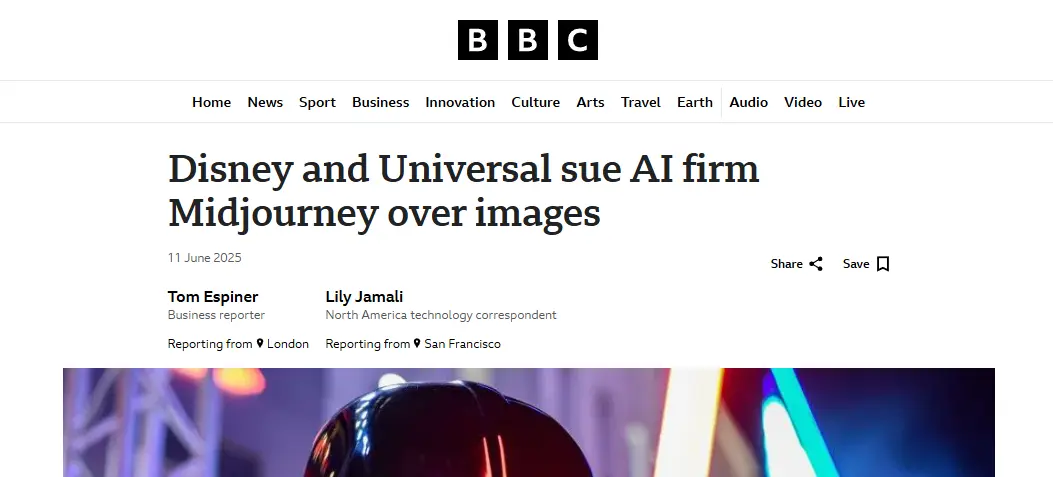
For example, Disney and Universal are suing AI firm Midjourney over its image generator, claiming Midjourney's tool makes countless copies of their most important characters from Star Wars and Despicable Me. The studios argue this constitutes clear violation of intellectual property rights and piracy.
While AI regulations continue developing, existing protections and systems can defend your brand against unauthorized use. Social media platforms offer profile verification and takedown processes that require contacting them with evidence of impersonation to remove fake accounts.
You can register trademarks with agencies like the U.S. Patent and Trademark Office (USPTO) to establish legal protection for your intellectual property. Protecting your intellectual property keeps your competitive edge and allows you to grow your business without worrying about others profiting from your ideas.
4) Legal Liabilities
Your brand is often misused on social media and that can create serious legal complications. Someone might create fake profiles impersonating your business, use your logo without permission, or sell counterfeit products using your brand name.
These situations damage your reputation and brand perception while potentially leading to lawsuits, trademark violations, and customer issues that create legal liability for your organization. What’s worse is that the consequences go beyond immediate reputational damage.
Brand protection helps identify and eliminate these issues before they spiral out of control. Early detection enables quick takedown requests and legal notices to prevent serious legal complications.
For example, imagine a fake Facebook page offering huge discounts on your products, collecting customer payments, and disappearing with the money. This scenario could devastate your reputation if it goes unnoticed, but brand protection helps catch and address it early, protecting customers and reducing legal liability.
5) Performing Brand Audits
A brand audit functions as a health check for your brand, and brand protection is a key component of that process. It helps assess how secure your brand is across digital platforms while identifying potential risks before they escalate.
The audit process evaluates how your brand appears across different platforms to check for inconsistencies or unauthorized use that could confuse customers or damage your reputation. It identifies risk areas like impersonation accounts, misuse of brand assets, or off-brand messaging that requires immediate attention. Brand protection also assesses current protection strategies to determine what works effectively and what needs improvement.
6) Monitoring Brand Mentions And Conversations
Social media conversations move quickly, and discussions about your brand can develop momentum independently of your direct involvement. Brand protection ensures you are aware of how your brand is discussed online and can take action when necessary.
It tracks brand mentions across social media to understand public opinion and sentiment toward your business. The monitoring process spots impersonation attempts or misuse of your brand identity, enabling quick action to remove or report fraudulent accounts. It also keeps track of competitor discussions to gain insights that inform your own strategies.
How To Protect Your Brand On Social Media
Protecting your brand on social media requires you to address the full spectrum of threats your business faces online. There are seven effective methods that provide reliable protection when implemented correctly and maintained consistently. Here they are:
1) Create A Strong Social Media Policy
A strong social media policy forms the foundation of your brand protection strategy. This blueprint defines how your brand should be represented online and helps everyone stay aligned with your brand's voice, values, and legal responsibilities.
Without proper guidelines, employees might unintentionally post something off-brand, inaccurate, or legally risky. Someone might share behind-the-scenes photos that accidentally reveal confidential information or post content that contradicts your brand messaging.
A well-defined policy prevents these mistakes and keeps your team consistent, especially when multiple people manage accounts or when working with outside agencies. Clear guidelines eliminate confusion and reduce the risk of damaging content.
Your social media policy should establish clear roles for who can post content and set guidelines for responding to comments or messages. Assign specific people to monitor brand mentions and online conversations while creating protocols for handling potential crises when they arise.
2) Monitor For Abuse Of Your Intellectual Property
Brand impersonation happens all the time. Attacks increased by 339% in 2022 and accounted for 32% of all social media attacks.
So make sure all trademarks, logos, and brand-related assets are registered with appropriate authorities and monitor for abuse in all markets where you operate. Implement a 24/7 monitoring system that alerts you to stolen content and fake accounts. Also, make sure both employees and customers know how to identify and report suspicious activity they encounter online. Having their help can save you so many headaches.
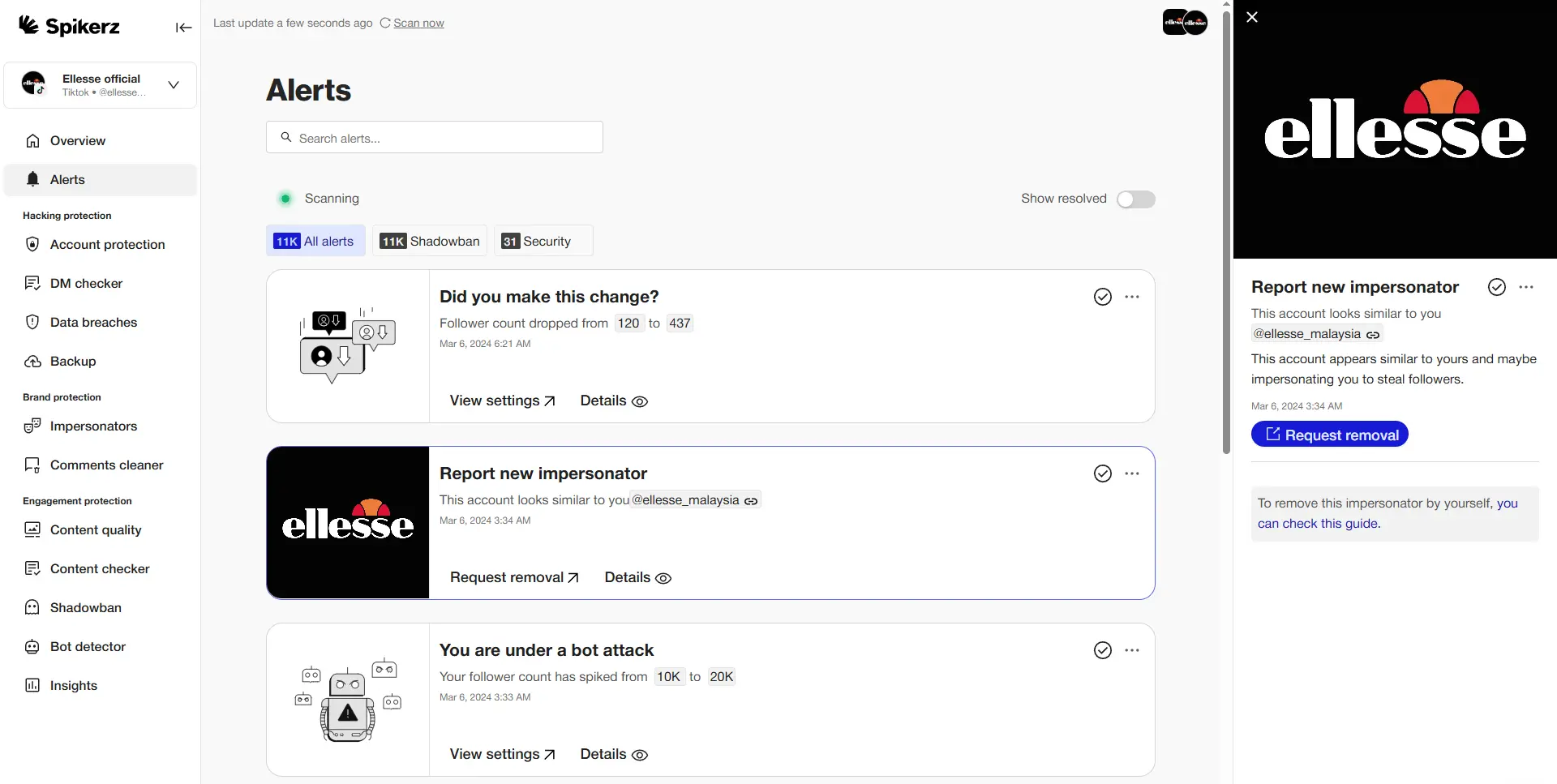
Lastly, use tools to make the process easier. With Spikerz, you can add your assets to our impersonation monitoring platform that scans social media for people misusing your brand's assets. It will alert you any time it finds someone misusing your brand assets or is acting suspiciously.
3) Audit Connected Third Party Apps
Periodically audit all third-party apps connected to your social media profiles to maintain security and control over your accounts. Over time, you connect tools and services that you may no longer be using, creating vulnerabilities if left unchecked. A lot of these tools request excessive permissions that can be exploited, so review them and remove the ones you no longer use or need.
4) Keep An Eye Out For Scams
Cybercriminals view your brand's social media presence as valuable targets for running scams. Once they compromise accounts, they can spread misinformation, hold accounts for ransom, post political messages, or run cryptocurrency scams.
In fact, a study by KnowBe4 found that there was a 17.3% increase in phishing emails vs. the previous six months (between Sep 15, 2024, and Feb 14, 2025) and 57.9% were sent from compromised accounts.
That’s why it’s essential to train your team to recognize phishing attempts on email and social media messages before they cause damage. Education provides your first line of defense against social engineering attacks.
That said, you don’t have to rely only on people recognizing phishing attempts, there are tools that can automatically detect them.
For example, social media security tools can automatically analyze direct messages and comments for spam, phishing, and bot activity without requiring constant manual oversight.
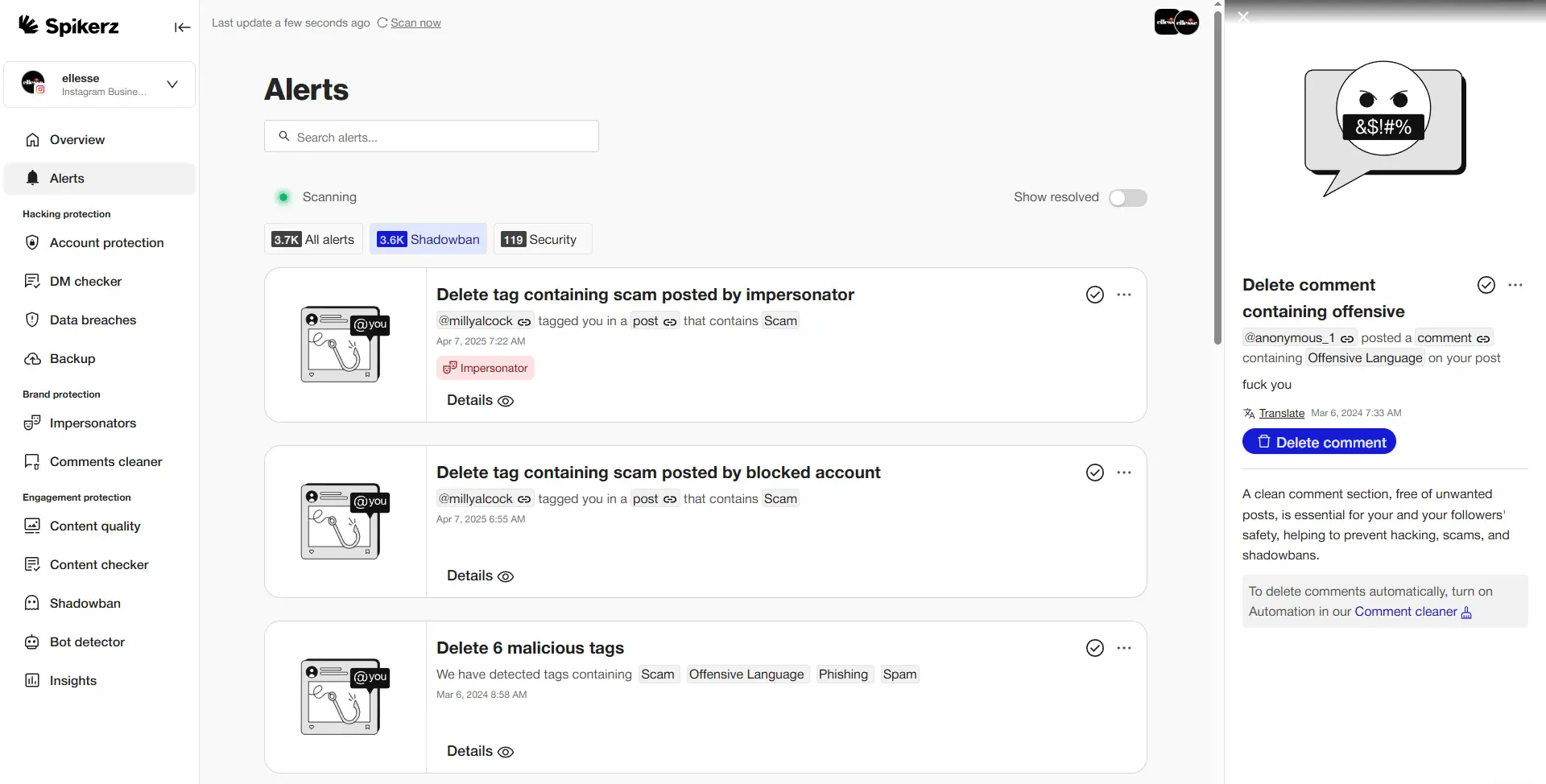
When you use Spikerz, our platform automatically scans your social media activity and alerts you when it finds suspicious content that requires attention. You receive a list of activities that need review and can take appropriate action against each threat.
5) Create A Crisis Management Plan
Create a crisis management plan because when crises hit, events move quickly and your response can make or break public trust. A solid crisis management plan provides your team with a clear roadmap for responding effectively under pressure.
Prepare a plan outlining specific steps to take during different types of crises that might affect your business. Designate one spokesperson to represent you and ensure consistent messaging across all communications during emergencies.
Provide honest, quick responses to regain customer trust and keep your audience updated on steps you're taking to resolve issues. Continually monitor public sentiment and take steps to rebuild your brand's reputation after a crisis.
Also, regularly assess potential vulnerabilities to improve preparation for future incidents. Use each crisis as a learning opportunity to strengthen your brand protection strategy and close security gaps you discover during the response process.
6) Monitor For Unauthorized Access To Your Profiles
Monitor for unauthorized access to protect your brand, data, and customer trust from security breaches. A single compromised account can lead to fake posts, phishing scams, and complete loss of control over your social media presence.
Ongoing monitoring helps detect suspicious logins, unrecognized devices, or changes in your account that may indicate potential security breaches. Early detection enables faster response and minimizes potential damage from unauthorized access.
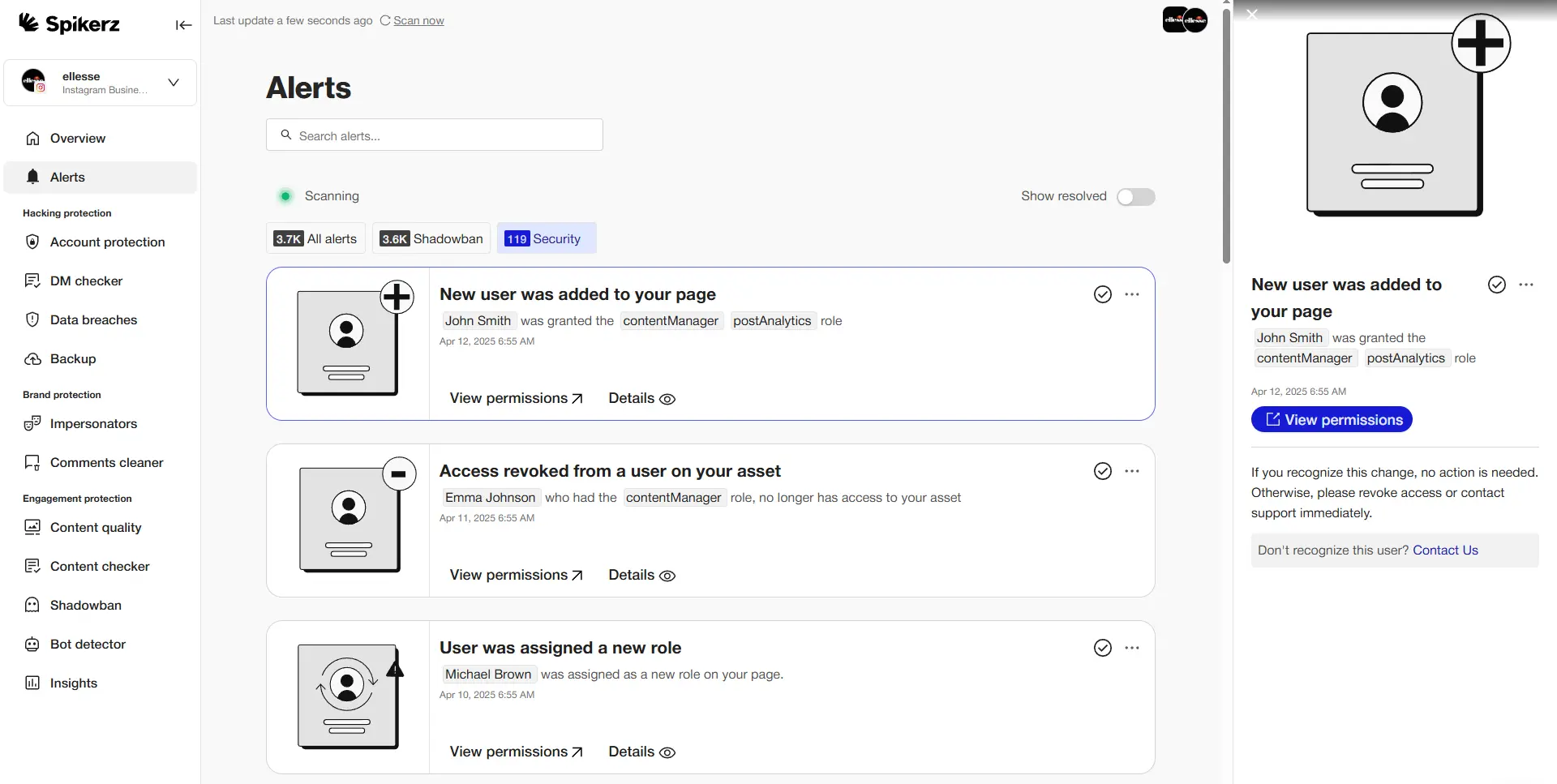
With Spikerz, you can actively monitor accounts for unauthorized access through systems that detect suspicious activity and block potential breaches. Our platform immediately changes passwords when threats are detected, preventing anyone from using your account for harmful purposes, stealing information, or locking you out.
7) Backup Your Content Regularly
Back up your social media content regularly to avoid losing content and other assets due to accidental deletion, platform issues, or cyberattacks. Social media platforms don't always guarantee full recovery options when problems do happen.
Regular backups provide peace of mind and ensure you're prepared to recover quickly from all kinds of data loss scenarios. You can use the platform’s backup tool to manually do it yourself or use third party options to automatically do it for you.
However, one thing we want to emphasize is that manual backups can be inconsistent and time-consuming, making automated solutions more reliable for busy businesses. Automated systems ensure regular archiving without requiring constant attention from your team members.
For example, with Spikerz, the backup process runs automatically to archive your social media content regularly. If posts are accidentally deleted, removed by platforms, or lost during account issues, Spikerz maintains secure copies ready for recovery whenever needed.
Conclusion
Protecting your brand on social media requires more than hope and basic security measures. The threats are real, persistent, and growing more sophisticated each day. Every business with an online presence faces risks from impersonators, hackers, scammers, and other bad actors who see your success as an opportunity for exploitation.
However, If you implement the strategies we've shared above, you’ll have proven defenses against them. Each method addresses specific vulnerabilities and contributes to a complete protection framework that protects your brand's reputation, intellectual property, and customer relationships.
Your brand's reputation took years to build but can be destroyed in minutes. Don't leave it vulnerable to preventable threats when comprehensive protection is available. Take action right now to protect your digital assets before criminals decide to target your business.

